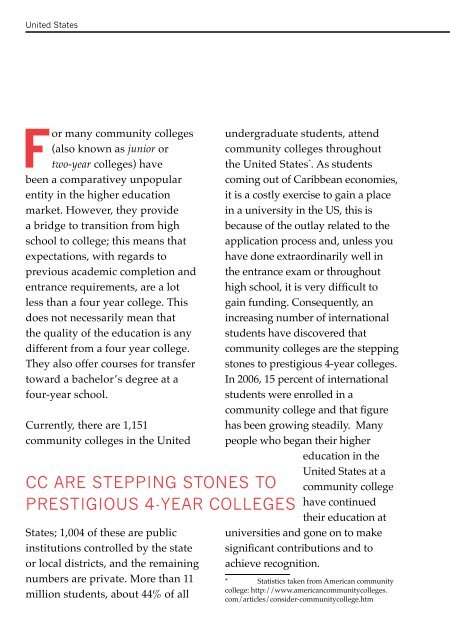Studying abroad
the guide for Caribbean students
the guide for Caribbean students
You also want an ePaper? Increase the reach of your titles
YUMPU automatically turns print PDFs into web optimized ePapers that Google loves.
United States<br />
223<br />
For many community colleges<br />
(also known as junior or<br />
two-year colleges) have<br />
been a comparativey unpopular<br />
entity in the higher education<br />
market. However, they provide<br />
a bridge to transition from high<br />
school to college; this means that<br />
expectations, with regards to<br />
previous academic completion and<br />
entrance requirements, are a lot<br />
less than a four year college. This<br />
does not necessarily mean that<br />
the quality of the education is any<br />
different from a four year college.<br />
They also offer courses for transfer<br />
toward a bachelor’s degree at a<br />
four-year school.<br />
Currently, there are 1,151<br />
community colleges in the United<br />
cC are stepping stones to<br />
prestigious 4-year colleges<br />
States; 1,004 of these are public<br />
institutions controlled by the state<br />
or local districts, and the remaining<br />
numbers are private. More than 11<br />
million students, about 44% of all<br />
undergraduate students, attend<br />
community colleges throughout<br />
the United States * . As students<br />
coming out of Caribbean economies,<br />
it is a costly exercise to gain a place<br />
in a university in the US, this is<br />
because of the outlay related to the<br />
application process and, unless you<br />
have done extraordinarily well in<br />
the entrance exam or throughout<br />
high school, it is very difficult to<br />
gain funding. Consequently, an<br />
increasing number of international<br />
students have discovered that<br />
community colleges are the stepping<br />
stones to prestigious 4-year colleges.<br />
In 2006, 15 percent of international<br />
students were enrolled in a<br />
community college and that figure<br />
has been growing steadily. Many<br />
people who began their higher<br />
education in the<br />
United States at a<br />
community college<br />
have continued<br />
their education at<br />
universities and gone on to make<br />
significant contributions and to<br />
achieve recognition.<br />
* Statistics taken from American community<br />
college: http://www.americancommunitycolleges.<br />
com/articles/consider-communitycollege.htm<br />
Why CC?<br />
Community colleges are the<br />
gateway to higher education in<br />
the United States for the following<br />
reasons:<br />
• Lower cost<br />
Community college tuition and<br />
fees average $6,500 per year, which<br />
is significantly lower than that of<br />
4-year colleges and universities.<br />
Students can lower the overall cost<br />
of a bachelor’s degree by taking<br />
the first 2 years of course credits at<br />
a community college.<br />
• Excellent transfer<br />
opportunities<br />
Most community colleges have<br />
agreements with 4-year colleges<br />
and universities (called articulation<br />
or 2 + 2 transfer agreements) which<br />
allow students to transfer their<br />
community college credits toward<br />
a university degree. Thus, students<br />
are able to attend a community<br />
college for 2 years of study, obtain<br />
an associate degree, and then<br />
complete 2 years at a university to<br />
obtain a bachelor’s degree. Many<br />
state universities give preference<br />
to qualified students who transfer<br />
from a community college in that<br />
state.<br />
• Flexible English<br />
proficiency requirements<br />
Community colleges provide their<br />
own assessment and offer IEPs to<br />
students who require additional<br />
English proficiency, TOEFL scores<br />
cc offer<br />
intensive english<br />
programmes<br />
are not always critical to the<br />
admissions process. As community<br />
colleges offer excellent IEPs and<br />
ESL programmes, many can offer<br />
more flexible TOEFL requirements.<br />
Moreover, some community<br />
colleges will accept an IELTS score<br />
in place of the TOEFL score.<br />
• Focus on teaching and<br />
student success<br />
Though community college<br />
lecturers do conduct research<br />
and publish articles and books,














